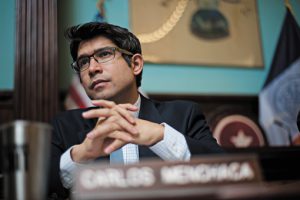
The All Souls Procession
The unique All Souls Procession in Tucson, Arizona, draws its inspiration from the traditional Mexican holiday Día de los Muertos (Day of the Dead). Launched in 1990 as a performance piece by local artist Susan Johnson to commemorate her late father, it has grown to become a two-day event that melds a myriad of cultural … Read more

10 Things to do in Nashville
Nashville’s place in America’s musical heritage has always made it a must-see destination for country music fans. But an expanding food scene and growing cultural diversity, propelled by a wave of new immigrants, has transformed “Music City” into the new “it” city. 1. Visit an American icon. No visit to Music City is complete without … Read more

Unaccompanied Kids and Unintended Consequences
In 2014, a rumor spread through Central America that anyone who hoped to reunify with family members in the United States should leave immediately. The rumor, apparently picked up and relayed by one or more television reporters in Honduras, was unequivocal: it was now or never. The TV reports claimed that, due to “changes in … Read more

Yes: Violence and Murder Are Decreasing in Mexico
When Mexican President Felipe Calderón left office in 2012, the nation’s war on the drug cartels had already claimed 60,000 lives. Now, two years into the presidency of his successor, Enrique Peña Nieto, security conditions are still far from praiseworthy, but have improved in several key areas. Homicides, the most reliable indicator for measuring public … Read more

No: Mexican Homicide and Crime Rates Remain High
As a presidential candidate, Enrique Peña Nieto promised “adjustments,” rather than any major changes, to the security strategy of the outgoing administration—and that is precisely what he has delivered as president. While there have been subtle—and not so subtle—shifts from the policies pursued by former President Felipe Calderón, there has not been a clear break … Read more

Politics Innovator: Carlos Menchaca
In the weeks following Hurricane Sandy in fall 2012, neighborhoods along the waterfront of Brooklyn, New York, were unrecognizable. Homes and local businesses were destroyed, power was out, and community members grew frustrated at the government’s slow response. Carlos Menchaca, who was working as an aide for then-City Council Speaker Christine Quinn, shared their frustration. … Read more

Arts Innovator: Matika Wilbur
Matika Wilbur left a budding career as a Seattle photographer two years ago to embark on an American road trip unlike any other. Her destination: the diverse lands and communities of the now 566 federally recognized Native American tribes in the United States. “I was 28 years old and had a fabulous gallery and a … Read more
Monday Memo: Ecuador Amendments — P&G Tax Fraud — Brazil Solar Parks — U.S. Midterm Elections – Colombia Paramilitary Sentenced
This week’s likely top stories: Ecuador’s National Assembly dismisses referendum on controversial constitutional amendments; Argentina suspends Proctor & Gamble for fiscal fraud; Brazil grants contracts for 31 new solar parks; U.S. gears up for midterm elections and immigration reform; Colombian court sentences AUC paramilitary leader to 8 years. Ecuador’s National Assembly Strikes Down Referendum on … Read more
Day of the Dead Celebrations Unite Food and Memory
This is one dinner party where the guests of honor are only there in spirit. But what a feast it is! On Day of the Dead, the holiday that starts at midnight on the day following Halloween, the souls of lost relatives are reunited with the living. And like so many other traditions, food is … Read more
What Next, Canada?
As the dust slowly settles on last week’s terrorist attacks in St. Jean, Québec and the Canadian Parliament in Ottawa, it may be a good time to assess the fallout. Overall, Canadians did not panic, and responded with compassion and moderation. The Canadian media avoided the sensational, and stuck to a balanced and thoughtful coverage. … Read more
IACHR Urges U.S. to Close Immigrant Detention Centers
The Inter-American Commission on Human Rights (IACHR) urged the United States yesterday to close detention centers for immigrant children and their families. IACHR member Felipe González noted that the Commission has continually affirmed that children should not be held in detention centers. However, the U.S. currently has three detention centers open in Pennsylvania, Texas and … Read more
Gulf Cartel Leader in Federal Court
Juan Francisco Sáenz-Tamez, the 23-year-old head of Mexico’s Gulf Cartel, has made his first court appearance, the U.S. Department of Justice announced on Tuesday. Sáenz-Tamez was arrested by federal officials in Edinburg, Texas on October 9 and faces life in federal prison if convicted of drug charges. Sáenz-Tamez was arrested on charges of money laundering … Read more
Dealing with Terrorism in North America
Author’s note: Following the Boston shooting in April 2013, I wrote about how North America would continue to face the threat of domestic terrorism. Yesterday, Canada’s Parliament was assailed by what is described as a “lone wolf” gunman. This was the second attack in a week, and Canada has lost two soldiers to the violence. … Read more

Hard Talk
Is Mexico’s security situation improving? Yes: Eduardo Guerrero; No: Alejandro Hope
The Republican Electoral Paradox
As the U.S. nears its mid-term elections, primetime U.S. media events—the recent debate on the war against ISIS, global terrorism, the international Ebola scare, and the pending approval of the Keystone Pipeline—are making top news fodder in Canada as well. The upcoming U.S. elections on November 4, 2014 are no exception. With President Obama’s low … Read more


